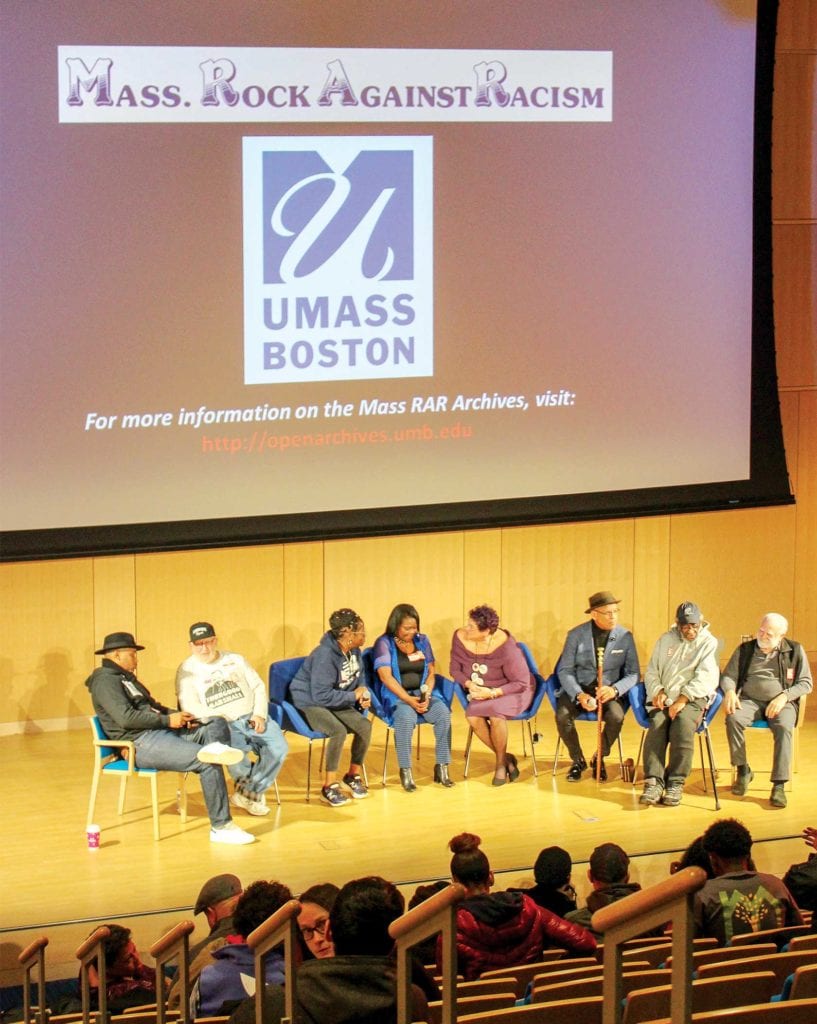Celebrating 40 Years of revolutionary music
BPL hosts Mass Rock Against Racism anniversary event

On Saturday, Nov. 23, Massachusetts Rock Against Racism celebrated 40 years supporting and inspiring young people in the Greater Boston area. The all-day festival at the Boston Public Library’s central branch included racial justice workshops and panels, live artmaking, a hip-hop dance party for teens and performances by a diverse group of local artists.

Volunteer Jiin Cruz works the booth for the event’s live community art making project. PHOTO: CELINA COLBY
The event also served to launch a public archive housed in the university archives and special collections in the Joseph P. Healey Library at the University of Massachusetts Boston. The archive features around 100 digitized tapes created by Mass Rock Against Racism, chronicling the group’s years of work for social change in the 1980s.
Reebee Garofalo founded Mass Rock Against Racism in 1979, based on the UK movement of the same name that uses music to unite people, especially young people, across racial divides. Garofalo is also the founder of the HONK Festival, another annual music-based community project.
The organization was born during a pivotal time in Boston’s racial history, when court-ordered busing for desegregation was causing violent riots and furthering stereotypes and divided neighborhood sentiment throughout the city.
During its lifetime, the organization ran programs in public schools like “Rock and Rap” and a cable program called “Can’t Music Bring Us Together.” This was all done with a volunteer staff. In 1983, the group received a grant to fund a full-scale after-school program in the offices of UMass Boston. Later, it produced benefit concerts and outdoor festivals as well as a TV show on cable access called “But Can You Dance To It?” Each effort worked towards the same end of using music as a common language to bridge cultural gaps.
The audio and video programming created by Mass Rock Against Racism was always focused on highlighting diverse local artists, but it also featured big names like George Benson, Run-DMC, Donna Summer and Jeffrey Osborne. Because of an ongoing partnership with cable television that allowed the organization to record these materials, many of these videos are available through the newly created archive.
The well-attended celebration aimed to remind community members of what’s possible when art and activism come together. Though Mass Rock Against Racism is no longer functioning, the ripple effect of its work can be seen in contemporary events like BAMS Fest, which, although not targeted specifically at young people, brings the community together through multicultural music, dance and spoken-word performances.
The innovative programming documented in the UMass archives and the inspired crowd at the anniversary party indicate that the impact of Mass Rock Against Racism will continue to flow through the local arts scene for decades to come.







